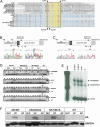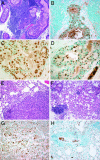Mutation of the androgen receptor causes oncogenic transformation of the prostate
- PMID: 15657128
- PMCID: PMC544619
- DOI: 10.1073/pnas.0408925102
Mutation of the androgen receptor causes oncogenic transformation of the prostate
Abstract
Recent evidence demonstrates that the androgen receptor (AR) continues to influence prostate cancer growth despite medical therapies that reduce circulating androgen ligands to castrate levels and/or block ligand binding. Whereas the mutation, amplification, overexpression of AR, or cross-talk between AR and other growth factor pathways may explain the failure of androgen ablation therapies in some cases, there is little evidence supporting a causal role between AR and prostate cancer. In this study, we functionally and directly address the role whereby AR contributes to spontaneous cancer progression by generating transgenic mice expressing (i) AR-WT to recapitulate increased AR levels and ligand sensitivity, (ii) AR-T857A to represent a promiscuous AR ligand response, and (iii) AR-E231G to model altered AR function. Whereas transgenes encoding either AR-WT or AR-T857A did not cause prostate cancer when expressed at equivalent levels, expression of AR-E231G, which carries a mutation in the most highly conserved signature motif of the NH2-terminal domain that also influences interactions with cellular coregulators, caused rapid development of prostatic intraepithelial neoplasia that progressed to invasive and metastatic disease in 100% of mice examined. Taken together, our data now demonstrate the oncogenic potential of steroid receptors and implicate altered AR function and receptor coregulator interaction as critical determinants of prostate cancer initiation, invasion, and metastasis.
Figures




Similar articles
-
A gene signature identified using a mouse model of androgen receptor-dependent prostate cancer predicts biochemical relapse in human disease.Int J Cancer. 2012 Aug 1;131(3):662-72. doi: 10.1002/ijc.26414. Epub 2012 Jan 24. Int J Cancer. 2012. PMID: 22275114
-
Collocation of androgen receptor gene mutations in prostate cancer.Clin Cancer Res. 2001 May;7(5):1273-81. Clin Cancer Res. 2001. PMID: 11350894
-
Selective role of an NH2-terminal WxxLF motif for aberrant androgen receptor activation in androgen depletion independent prostate cancer cells.Cancer Res. 2007 Oct 15;67(20):10067-77. doi: 10.1158/0008-5472.CAN-07-1267. Cancer Res. 2007. PMID: 17942941
-
Pleiotropic functional properties of androgen receptor mutants in prostate cancer.Hum Mutat. 2009 Feb;30(2):145-57. doi: 10.1002/humu.20848. Hum Mutat. 2009. PMID: 18800375 Review.
-
Androgen receptor (AR) coregulators: an overview.Endocr Rev. 2002 Apr;23(2):175-200. doi: 10.1210/edrv.23.2.0460. Endocr Rev. 2002. PMID: 11943742 Review.
Cited by
-
ETV1 directs androgen metabolism and confers aggressive prostate cancer in targeted mice and patients.Genes Dev. 2013 Mar 15;27(6):683-98. doi: 10.1101/gad.211011.112. Genes Dev. 2013. PMID: 23512661 Free PMC article.
-
Androgen receptor (AR) physiological roles in male and female reproductive systems: lessons learned from AR-knockout mice lacking AR in selective cells.Biol Reprod. 2013 Jul 25;89(1):21. doi: 10.1095/biolreprod.113.109132. Print 2013 Jul. Biol Reprod. 2013. PMID: 23782840 Free PMC article. Review.
-
Natural disordered sequences in the amino terminal domain of nuclear receptors: lessons from the androgen and glucocorticoid receptors.Nucl Recept Signal. 2007 Mar 9;5:e001. doi: 10.1621/nrs.05001. Nucl Recept Signal. 2007. PMID: 17464357 Free PMC article. Review.
-
Accumulating progenitor cells in the luminal epithelial cell layer are candidate tumor initiating cells in a Pten knockout mouse prostate cancer model.PLoS One. 2009 May 22;4(5):e5662. doi: 10.1371/journal.pone.0005662. PLoS One. 2009. PMID: 19461893 Free PMC article.
-
Maintenance of androgen receptor inactivation by S-nitrosylation.Cancer Res. 2013 Nov 15;73(22):6690-9. doi: 10.1158/0008-5472.CAN-13-1042. Epub 2013 Oct 11. Cancer Res. 2013. PMID: 24121486 Free PMC article.
References
-
- Huggins, C., Stephens, R. C. & Hodges, C. V. (1941) Arch. Surg. 43, 209.
-
- Gingrich, J. R., Barrios, R. J., Morton, R. A., Boyce, B. F., DeMayo, F. J., Finegold, M. J., Angelopoulou, R., Rosen, J. M. & Greenberg, N. M. (1996) Cancer Res. 56, 4096–4102. - PubMed
-
- Tilley, W. D., Buchanan, G., Hickey, T. E. & Bentel, J. M. (1996) Clin. Cancer Res. 2, 277–285. - PubMed
-
- Han, G., Foster, B. A., Mistry, S., Buchanan, G., Harris, J. M., Tilley, W. D. & Greenberg, N. M. (2001) J. Biol. Chem. 276, 11204–11213. - PubMed
Publication types
MeSH terms
Substances
Grants and funding
LinkOut - more resources
Full Text Sources
Other Literature Sources
Medical
Molecular Biology Databases
Research Materials

